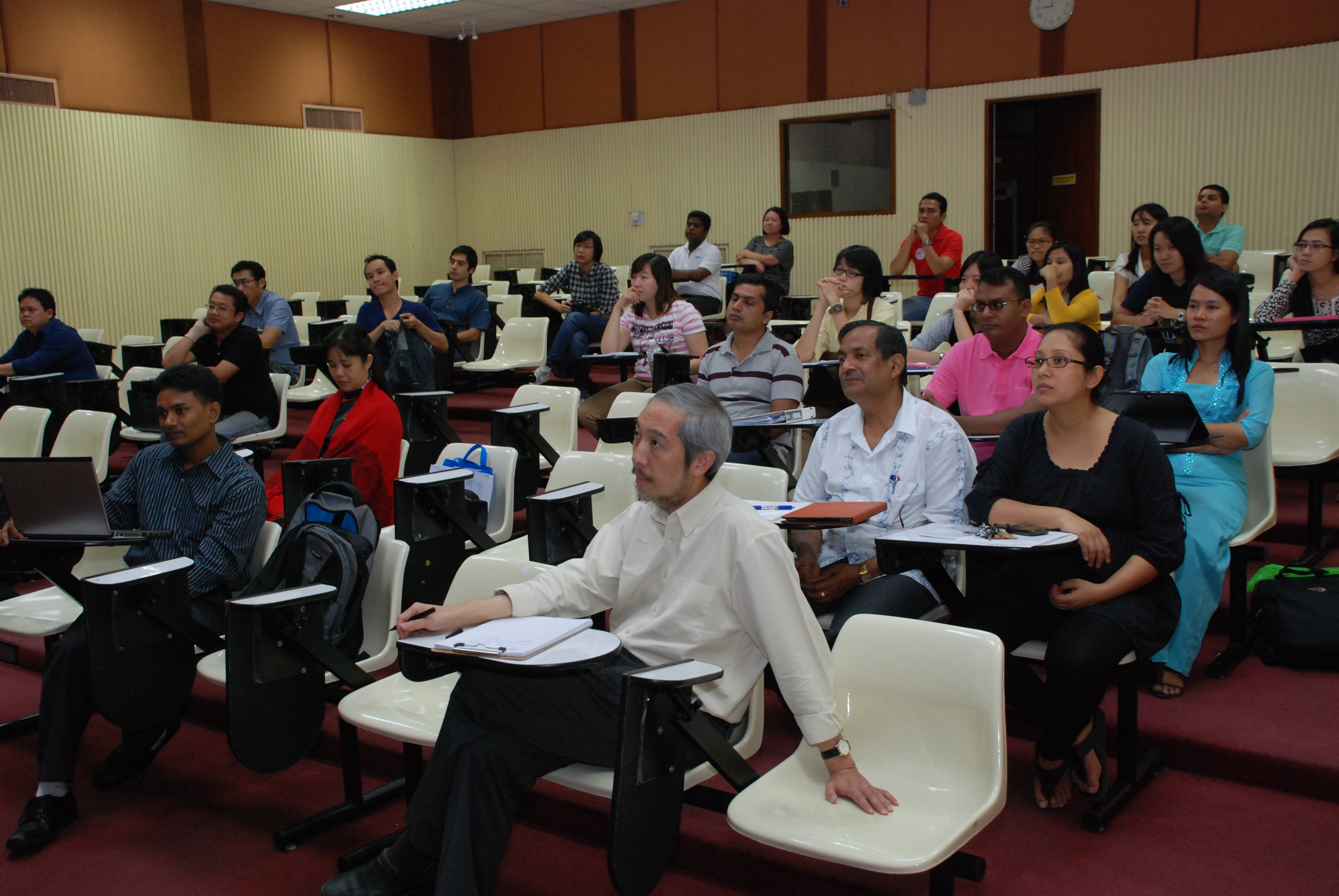Mr. Saswata Sanyal and Mr. Shah Jawad Shamir, stated that the Tsunami
of 2011 is regarded as a Level II disaster which occurs only once in a
thousand years. Narrating a story from the city of Kesennuma, they
stated that the city was debating on whether to preserve symbols of the
disaster or to wipe out bad memories. The case of a ship that moved one
kilometer inside the coastline, and which is still lying in the city
has led to divided opinions. They also discussed the debate about
creating breakwaters and their utility in warding off disasters.
While Sanyal is a doctoral student at the Disaster Preparedness,
Mitigation and Management (DPMM) field of study, Shamir is a Master’s
student. Both went to Japan under the Intensive Programme on
Sustainability (IPoS) Program 2013.
Ms. Pone Nyet Khaing, another DPMM student shared her story about
re-experiencing the earthquake in a specially created facility. This
facility allows visitors to experience an earthquake, following which
they are guided to replicas of the destruction caused by the
earthquake. Another section of this facility is dedicated to protection
and reduction of losses after the disaster. Besides showing a movie on
the disaster, the facility also provides a guidance room and a trauma
center facilities if the visitors find the experience too shocking, she
added.
Md. Shahab Uddin, a doctoral student of DPMM highlighted the plans for
a tsunami-resilient city. He also spoke of the efficacy of breakwaters
in tackling diasters. Mr. Wifandy Purba, Master’s student elaborated on
the extent of challenges following the disaster. A total of 10 million
tonnes of tsunami deposit and a damage to one million buildings is a
consequence of the disaster. Looking at environmental issues from a
geotechnical perspective, he added that a three-year target has been
set for treating tsunami-related waste. Ms. Khaing, Mr. Shahab Uddin
and Mr. Purba went to Japan under the Disaster Resilient Countries
(DRC) Program.
Issues brought to the fore by the five students included depopulation
of areas, accelerated migration to cities, disagreement among
community, consensus-building problems, internal debt of the
government, suicides, mass land subsistence, and destruction of
livelihoods. Earlier, welcoming the students, Dr. Pennung Warnitchai of
AIT’s School of Engineering and Technology (SET) said that next year,
AIT plans to send more students under the two exchange programs. Prof.
Jayant Kumar Routray of AIT’s School of Environment, Resources and
Development (SERD), and Ms. Vineeta Thapa, Senior Program Officer, also
attended the seminar.
About Disaster Resilient Countries (DRC) Program: DRC
is a consortium of International Human Resource Development for
Construction of Disaster Resilient Countries. It is an initiative of
Kyoto University and ASEAN Alliance Universities that includes the
Asian Institute of Technology, Chulalongkorn University, Kasetsart
University, Institut Teknologi Bandung, University of Malaya, and
Vietnam National University. This is a University Project by Ministry
of Education, Culture, Sports Science and Technology (MEXT) of Japan on
Disaster Risk Mitigation, Recovery and Reconstruction for Re-Inventing
Japan. More details are available at this link: http://www.drc.t.kyoto-u.ac.jp/en/program.html
About Intensive Programme on Sustainability (IPoS)
Program: IPoS is aimed at cultivating and leveraging
innovative ideas towards sustainability with the emphasis on the
relationship between Asia and the global society. The University of
Tokyo (UT), Japan along with Asian Institute of Technology (AIT),
Thailand, launched this program in 2004, with support from the Alliance
for Global Sustainability (AGS), and with the inspiration from Youth
Encounter on Sustainability (Y.E.S.) of ETHZ. The Integrated Research
System for Sustainability Science (IR3S) joined IPoS since 2006, and
this brought faculty members and students from Hokkaido University,
Ibaraki University, Kyoto University and Osaka University. In addition
to AGS and IR3S, Nissan Science Foundation (NSF) has sponsored IPoS
since 2006. More details are available at this link: http://www.ipos.k.u-tokyo.ac.jp


